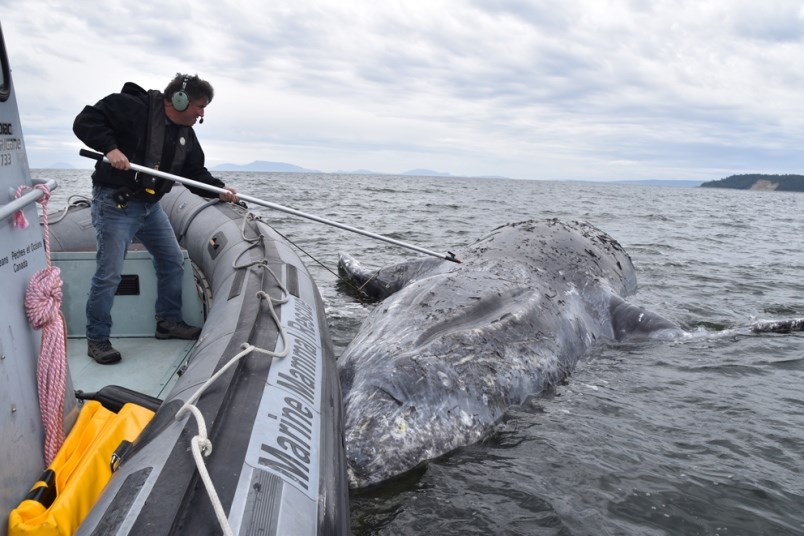It’s too soon to tell what caused the death of a whale that was spotted in Boundary Bay last week.
Fisheries and Oceans Canada A/marine mammals coordinator Paul Cottrell said there was no obvious cause of death, but investigators took photographs and multiple tissue and organ samples for further analysis following a necropsy done on the animal at Sea Island last Thursday morning.
He said preliminary observations indicated the whale’s body condition was better than the previous five whales found dead in B.C. waters – three stranded in Haida Gwaii, one near Victoria and one on the west coast of Vancouver Island.
“The other five were all quite compromised and emaciated,” he said.
The whale found at Boundary Bay, however, had higher fat content in the blubber, although Cottrell cautioned that more testing is required.
He said necropsies are crucial to determine if there are other factors at work – including vessel strikes, entanglements with fishing gear or pathogens – and to identify potential threats to the rest of the population.
That’s where the public can be of invaluable assistance, Cottrell said.
“Our B.C. marine mammal response program is really dependent on the eyes and ears of the public that are out on the water, that are walking beaches, that see these dead animals or see injured, distressed or entangled animals to call us immediately,” he said.
Canada’s marine mammal incident reporting hotline, at 1-800-465-4336, is monitored 24 hours a day and ensures that investigators can get to a whale as soon as possible.
In the case of a dead whale, a swift response is crucial because fresh tissue and organ samples can provide better information, Cottrell said.
In the case of a stranded live whale, a quick response might save its life.
“An example is the live stranded grey whales that we had in Boundary Bay,” Cottrell said, referring to an incident last month. “We received that information immediately and we were able to get out on the same low tide and then help those animals get back out… into deep water and save those two animals.”
Although listed as a species of special concern under Canada’s Species at Risk Act, eastern North Pacific grey whales have being doing well of late. The U.S. National Oceanic and Atmospheric Administration says the population has recovered since the whaling era and has grown to about 27,000.
With files from the Victoria Times Colonist



